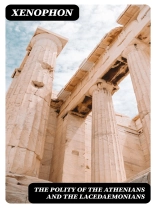In 'The Polity of the Athenians and the Lacedaemonians, ’ Xenophon presents a meticulous comparison of the political systems of Athens and Sparta, offering a profound exploration of governance, civic duty, and societal values in ancient Greece. Written in a clear yet sophisticated prose style, this work is not merely a historical account but a reflective analysis that invites readers to consider the implications of democracy versus oligarchy. Xenophon employs a pragmatic lens, revealing the strengths and weaknesses of both polities, while articulating the philosophical underpinnings that inform Athenian democracy and Spartan martial aristocracy. The text serves as a critical source for understanding the broader socio-political dynamics of Classical Greece, contextualizing the ongoing tensions between these rival city-states during a period of significant transformation. Xenophon, a philosopher, historian, and soldier, was profoundly influenced by his experiences in the Peloponnesian War and his association with Socratic thought. His works often reflect an aristocratic perspective, emphasizing moral and ethical considerations in leadership and governance. Written during the 4th century BCE, 'The Polity of the Athenians and the Lacedaemonians’ stands as a testament to Xenophon’s desire to understand and convey the essence of Greek political life, shaped by both personal insights and the sociopolitical climate of his time. This book is recommended for scholars, historians, and anyone interested in the foundations of Western political thought. Xenophon’s vivid portrayals and sharp analyses serve as engaging lenses through which readers can examine the enduring relevance of these ancient political ideals. Such insights make it a pivotal read for anyone seeking to grasp the complexities of governance that resonate throughout history.
O autorze
Xenophon, an ancient Greek philosopher, historian, soldier, and a disciple of Socrates, is a figure of considerable historical significance. Born in Athens around 430 BCE, to a family of the equestrian class, he was a contemporary of the Peloponnesian War. Xenophon’s extensive writings offer penetrating insights into Greek military affairs, philosophy, and daily life. Among his well-known works, 'The Anabasis’ documents his participation in the expedition of Cyrus the Younger against the Persian king Artaxerxes II and the ensuing harrowing retreat of the Greek mercenaries, known as the Ten Thousand, after Cyrus’s death. His 'Cyropaedia’ is a didactic biography of Cyrus the Great, which presents ideal leadership and the education of a ruler. 'The Polity of the Athenians and the Lacedaemonians’ is a text that contrasts the governmental systems of Athens and Sparta, providing a valuable account of the social, military, and political practices of two prominent Greek city-states. Xenophon’s work is characterized by clear, direct expression, and a practical approach to philosophical issues. His expertise in horsemanship led him to pen 'On Horsemanship, ’ an illuminating treatise on horse care and cavalry tactics. Xenophon’s oeuvre offers a unique perspective on Greek culture and continues to be studied for its historical and literary significance. His straightforward prose style has been influential, marking him as one of the fathers of the 'realist’ tradition in historiography.












